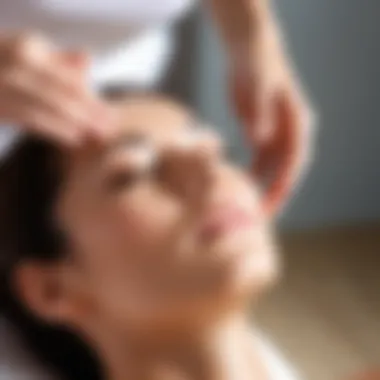Prevent Hair Loss: Effective Prevention Strategies


Intro
Hair loss is a complex issue that can affect individuals across all demographics, regardless of age or gender. Understanding the reasons behind hair thinning is critical for those who wish to maintain a full head of hair. Factors range from genetics, hormonal changes, nutritional deficiencies, to environmental stressors. This article will explore various preventative measures that can be implemented effectively to minimize the risk of hair loss.
With actionable insights derived from dermatological research and practical lifestyle tweaks, readers will find strategies that suit their personal needs. It is essential to dismantle some common misconceptions surrounding hair care and focus on interventions supported by scientific evidence.
In this comprehensive guide, we will scrutinize hair care routines, dietary choices, and the necessity of stress management in the pursuit of healthier hair. Let's delve deeper into these methods.
Understanding Hair Loss
Understanding hair loss is crucial for anyone concerned about maintaining their hair's health. By exploring the fundamentals of hair growth, different hair loss patterns, and their causes, individuals can take informed steps to combat thinning or losing hair. The significance of comprehending hair loss goes beyond aesthetics; it also impacts emotional well-being and self-esteem. By recognizing the signs and reasons behind hair loss, individuals can approach the situation with a clear strategy.
The Basics of Hair Growth
Hair growth occurs in cycles, which involve three main phases: anagen, catagen, and telogen. The anagen phase is the active growth phase, where hair follicles produce new strands. This phase can last from two to six years. The catagen phase is a transitional stage that lasts a few weeks. Here, hair growth slows, and strands prepare to shed. Lastly, the telogen phase is a resting stage lasting about three months. After this phase, hair falls out, and the cycle begins anew.
Understanding this cycle is vital because disruptions can lead to excess hair loss. Healthy hair growth relies on a balanced diet, proper care, and a healthy lifestyle. Small changes can promote optimal growth.
Common Types of Hair Loss
There are several recognized types of hair loss, each with unique characteristics. The most common include:
- Androgenetic Alopecia: Often referred to as male or female pattern baldness; typically hereditary and characterized by thinning at the crown or hairline.
- Alopecia Areata: This autoimmune condition leads to patchy hair loss and can affect anyone at any age.
- Telogen Effluvium: A temporary condition often triggered by stress or hormonal changes; it results in noticeable shedding after a stressful event.
- Traction Alopecia: Caused by extended tension on hair strands from hairstyles like tight ponytails or braids.
Identifying the type of hair loss is essential for choosing the right approach to treatment and prevention.
Identifying the Causes
Identifying the causes of hair loss involves looking into various factors that contribute to this condition. Some common causes include:
- Genetics and Family History: In many cases, hair loss runs in families. Understanding genetic predispositions can help in planning preventive measures.
- Hormonal Changes: Fluctuations in hormones, particularly during pregnancy, menopause, or due to thyroid issues, can significantly impact hair health.
- Nutritional Deficiencies: A lack of essential nutrients, such as iron, vitamin D, and B vitamins, can result in compromised hair growth.
- Stress and Lifestyle Factors: Long-term stress can lead to hair loss. Poor sleep and lack of exercise worsen this condition.
- Underlying Medical Conditions: Conditions like lupus or thyroid disease can contribute to hair loss and should be addressed with a healthcare professional.
By understanding the various causes, individuals can take targeted actions to mitigate hair loss effectively.
Lifestyle Factors Impacting Hair Health
Lifestyle factors significantly influence hair health and can either contribute to or hinder hair loss. Understanding these elements empowers individuals to make informed choices that may enhance their hair's vitality and overall wellness. Lifestyle choices such as diet, exercise, sleep, and stress management play crucial roles in maintaining healthy hair.
The Role of Nutrition
Essential Nutrients for Hair
Essential nutrients are critical to healthy hair growth. Nutrients such as proteins, vitamins, and minerals form the foundation for robust hair strands. Protein, primarily found in lean meats, fish, eggs, and legumes, is vital as hair is mainly composed of a protein called keratin. This makes including sufficient protein in one's diet essential for preventing hair loss.
Vitamins like Biotin and Vitamin D are also noteworthy. Biotin, for instance, helps strengthen hair and promote growth. Moreover, Vitamin D plays a significant role in the hair growth cycle, making its deficiency a potential factor in hair thinning. Key minerals such as iron and zinc are equally important, as they assist in nutrient delivery to hair follicles. A deficiency in iron might lead to hair shedding in some individuals, thus emphasizing the nutrient's significance.
Overall, ensuring a balanced intake of these nutrients can significantly contribute to hair health. However, it's essential to recognize that overly restrictive diets may deprive the body of vital nutrients, potentially leading to adverse effects on hair health.
Importance of Hydration
The importance of hydration cannot be overstated when discussing hair health. Water is often overlooked, yet it is pivotal for maintaining optimal hair moisture levels. Adequate hydration supports the overall bodily functions, which includes blood circulation that is necessary for nutrient delivery to the hair follicles.


If hair becomes dry and brittle, it may lead to increased breakage and hair loss. Drinking enough water maintains healthy hair strands, contributing to softness and resilience. Moreover, hydration impacts scalp health. A well-hydrated scalp helps create a suitable environment for hair growth. It is advisable to aim for at least eight glasses of water daily, adjusting for individual needs based on activity levels and climate.
Exercise and Circulation
Regular exercise is another impactful factor for healthy hair. It enhances blood circulation throughout the body, ensuring that hair follicles receive the necessary nutrients and oxygen for growth. Furthermore, exercise helps in reducing stress, which is a known trigger for hair loss. Physical activities, whether it be running, yoga, or swimming, contribute positively towards maintaining hair health. They aid in improving overall well-being, which ultimately reflects on hair condition.
Sleep and Hair Growth
Sleep plays an integral role in hair health as well. The body undergoes repair during sleep, including the biological processes essential for hair rejuvenation. A lack of sleep can disrupt hormonal balance, leading to hair loss. Aim for 7 to 9 hours of quality sleep each night to support hair growth and overall health. Maintaining a consistent sleep schedule can significantly help.
"Good habits create a good life. The same applies to hair health."
Hair Care Practices
Proper hair care practices play a significant role in maintaining hair health and preventing loss. The scalp and hair need adequate attention, just like any other part of the body. Incorporating the right methods, products, and techniques will improve both the aesthetics and durability of your hair.
Healthy hair is more than just clean strands; it involves understanding what your hair type needs. By customizing your hair care routine to align with the specific conditions of your hair and scalp, you can foster an environment conducive to growth while minimizing the risk of damage.
Choosing the Right Products
Selecting appropriate hair products is crucial. These products can greatly influence how your hair behaves and reacts to environmental stressors. The market offers a multitude of options, so careful consideration is needed.
Shampoos and Conditioners
Shampoos and conditioners are fundamental. Shampoos act as the first point of cleansing, removing dirt and excess oils. Their primary role is to maintain scalp health. Look for sulfate-free formulas as they are gentler and less drying on the hair and scalp.
Conditioners, on the other hand, restore moisture and manageability. Choosing products with ingredients like argan oil or keratin can enhance moisture retention. Both products must reflect your hair's unique needs. Some may require volumizing formulas, while others may benefit from deep moisturizing conditioners.
One unique feature to consider is the pH balance. A product that matches the scalp’s natural pH can help maintain hair integrity and shine.
Styling Products
Styling products are another essential category necessary for your hair care routine. These can help shape, hold, and manage hair. However, they can also be detrimental if not chosen wisely.
Key characteristics of styling products often include the level of hold they provide and their effect on the hair's texture. Products like mousse or gel might work well for creating volume or holding styles in place. Yet, it's important to avoid those with alcohol as they can lead to dryness over time.
A unique feature of styling products is their ability to offer both temporary and long-lasting effects. For example, a lightweight spray provides a simple finish without weighing down the hair, which is advantageous for a more natural look.
Gentle Hair Styling Techniques
Employing gentle hair styling techniques can significantly minimize breakage and other damage. It is prudent to avoid pulling too tightly when tying hair, as this creates unnecessary tension. Similarly, using soft hair ties can help maintain hair integrity.
Brushing hair from the ends upwards promotes less stress on the strands, making it easier to detangle without excessive force. Focus on using wide-tooth combs, especially when the hair is wet, which is when it is more vulnerable. This practice helps to maintain hair structure while also promoting a healthier scalp during styling.
The Impact of Heat and Chemicals
Heat and chemical exposure can cause serious damage if not managed correctly. Heat styling tools, such as straighteners or curling irons, should be used sparingly. Heat protects products can be valuable, creating a barrier that reduces potential damage.
Chemicals, used in treatments like perms or relaxers, may provide temporary benefits but can weaken hair in the long run. If used, it’s essential to follow up with proper conditioning treatments. Individuals should be aware of the potential long-term effects of heavy chemical use, as it may lead to thinning or breakage, emphasizing the need for moderation.
Stress Management


Stress plays a significant role in various bodily functions, including hair health. Many people do not realize how stress can influence hair loss. Understanding this connection can guide individuals toward more effective prevention tactics. In this section, we will explore how stress affects hair and provide actionable techniques to mitigate stress.
Understanding the Connection Between Stress and Hair Loss
Stress can disrupt the hair growth cycle. When a person experiences high levels of stress, the body triggers a response that affects hair follicles. The hair may enter a resting phase as a result. This phase is called telogen. It can lead to an increased shedding of hair. Furthermore, chronic stress might contribute to conditions like telogen effluvium, where significant hair loss occurs.
In terms of physiological responses, cortisol is a hormone released during stress. Elevated cortisol levels can lead to hair thinning over time. It can also exacerbate existing hair loss conditions such as alopecia areata. Stress management recognizes that controlling stress is critical for maintaining hair health.
Techniques for Reducing Stress
Finding effective ways to manage stress is crucial for hair preservation. The following techniques can provide relief and are adaptable to different lifestyles.
Mindfulness Practices
Mindfulness practices involve focusing on the present moment. These practices can help reduce anxiety and promote a sense of calm. Techniques such as meditation, yoga, or deep-breathing exercises enable individuals to disconnect from daily stressors.
A key characteristic of mindfulness is its accessibility. People can practice it anywhere. Additionally, it does not require any specific tools or locations. The unique feature of mindfulness is its ability to cultivate awareness of one's thoughts and feelings. By doing so, individuals can improve their emotional resilience. Mindfulness does not offer immediate solutions, but it contributes to long-term well-being. This makes it a beneficial choice for those looking to manage stress, thereby potentially reducing hair loss.
Physical Activities
Engaging in physical activities is another effective method of managing stress. Regular exercise can trigger the release of endorphins, which are chemicals that promote a feeling of happiness. Exercise can take many forms, such as walking, running, dancing, or weight lifting. People can choose an activity that fits their preferences and routines.
The key characteristic of physical activities is their dual benefit. They not only alleviate stress but also improve overall health. The unique feature of exercising is its capacity to release pent-up energy. This release helps in reducing feelings of tension. The main advantage of physical activities is their versatility and accessibility to most individuals. However, it is necessary to choose the right type of exercise that one enjoys to ensure consistency.
In summary, managing stress can significantly influence hair health. By utilizing mindfulness practices and physical activities, individuals can help mitigate the negative effects of stress. As such, making time for stress management techniques is a vital aspect of hair loss prevention.
Medical and Professional Advice
Seeking medical and professional advice is crucial for anyone dealing with hair loss. This topic shines a light on the importance of understanding the various dimensions of hair thinning and the potential interventions to consider. When combined with the insights gleaned from dermatology, professional consultations offer tailored management strategies that can significantly impact hair health.
One of the primary benefits of consulting a healthcare professional is the ability to receive an accurate diagnosis. Hair loss can stem from an array of factors, including genetic predisposition, hormonal changes, and stress. Without a clear understanding of the underlying causes, the likelihood of implementing effective solutions diminishes. A comprehensive assessment by a dermatologist not only identifies the root issues but also guides individuals towards appropriate treatments.
Moreover, medical advice can prevent potential missteps in self-treatment. Many over-the-counter products claim to be effective against hair loss; however, their lack of personalization may lead to undesirable results. In contrast, professional guidance allows for a tailored approach. By addressing individual needs, dermatologists can recommend specific regimens that cater to unique circumstances.
Consulting a Dermatologist
Consulting a dermatologist is an essential step toward effectively managing hair loss. Dermatologists specialize in skin and hair issues, which equips them with the expertise needed for accurate assessments. A consultation typically begins with an in-depth analysis of an individual’s medical history, lifestyle, and hair care practices.
During the consultation, the dermatologist may conduct various tests to determine the type of hair loss and its possible causes. This approach is vital as it ensures the chosen treatments align with an individual’s specific needs. Moreover, dermatologists can provide valuable insights on when to monitor progress and when to adjust the treatment plan for optimal results.
Potential Treatments and Interventions
Topical Treatments
Topical treatments are widely embraced for their convenience and direct application. These include products such as minoxidil, which are known for stimulating hair growth. Their key characteristic lies in their localized application, allowing them to target specific areas of concern effectively. As a result, these treatments can show promising results for various forms of hair loss, including androgenetic alopecia.
One significant feature of topical treatments is their non-invasive nature. For many individuals, this is a less intimidating option compared to surgical interventions. However, users should be aware of possible side effects, such as scalp irritation or unwanted hair growth in adjacent areas.
Oral Medications
Oral medications may also present an effective avenue for combating hair loss. Finasteride is perhaps the most recognized oral option, particularly for men. Its key characteristic is its ability to inhibit the hormone dihydrotestosterone (DHT), which is linked to hair thinning.


Research indicates that oral medications can lead to substantial improvements in hair density for eligible candidates. However, the unique feature of these medications is the need for ongoing use to maintain results. Furthermore, there are potential side effects, which can dissuade some individuals from pursuing this treatment route.
Addressing Underlying Health Conditions
Addressing underlying health conditions is crucial in the context of preventing hair loss. Many individuals may not realize that certain health issues can directly contribute to thinning or loss of hair. Thus, understanding these connections is vital for effective prevention strategies. Addressing such conditions may not only improve hair health but also enhance overall wellness.
Thyroid Health and Hair Loss
The thyroid gland plays an essential role in regulating metabolism and overall bodily functions. It produces hormones that significantly influence hair growth. Hypothyroidism, a condition where the thyroid does not produce enough hormones, is commonly linked to hair loss. Symptoms such as fatigue, weight gain, and dry skin often accompany hair thinning. Conversely, hyperthyroidism, where the thyroid overproduces hormones, can also lead to hair loss. Regular check-ups with a healthcare provider can help monitor thyroid levels and take necessary action before severe consequences occur.
Hormonal Imbalances
Hormones significantly affect hair growth and health. Both men and women can experience hormonal fluctuations that may destabilize hair cycles. Conditions such as polycystic ovary syndrome (PCOS) in women often result in elevated levels of androgen, a male hormone. This imbalance can contribute to thinning hair or even alopecia. For men, testosterone levels may impact hair loss patterns, especially if there is a genetic predisposition to androgenetic alopecia. Consulting a medical professional to evaluate hormone levels is essential for developing a tailored treatment plan that addresses these imbalances.
Nutritional Deficiencies
Nutritional deficiencies can severely impact hair health. Deficiencies in essential vitamins and minerals, such as iron, vitamin D, and vitamin B12, may lead to hair loss. Iron is particularly important; low iron levels can result in hair shedding due to insufficient oxygen flow to hair follicles. Similarly, vitamin D promotes the growth of hair follicles, and a deficiency can disrupt this process. A balanced diet rich in fruits, vegetables, lean proteins, and whole grains is vital for maintaining adequate nutrient levels. Regular dietary assessments can help identify gaps and ensure proper intake of necessary nutrients that support hair health.
Myths and Misconceptions
Understanding the myths and misconceptions surrounding hair loss is crucial for effective prevention and treatment. The hair care community often propagates statements that can misguide individuals seeking solutions to hair thinning. Debunking these myths not only clarifies what truly affects hair health but also empowers individuals to make informed decisions regarding their care routines.
The role of accurate information cannot be underestimated. Many beliefs about hair loss are rooted in misunderstandings that can lead to anxiety or inappropriate treatments. Knowing what is fact versus fiction allows readers to focus on quality solutions that enhance hair health. This ultimately saves time and resources while promoting a healthier mindset regarding hair upkeep.
Common Myths About Hair Loss
One prevalent myth is that frequent shampooing causes hair loss. In reality, washing hair does not contribute to thinning. Hair loss is largely dictated by genetic and health factors rather than washing frequency. It is important to choose suitable products that suit one's hair type.
Another misconception involves the idea that wearing hats or headgear can cause hair loss. While it's true that tight hats may cause traction alopecia, normal hat use does not contribute to hair thinning.
Public assumptions suggest that hair loss primarily concerns older adults. However, individuals of all ages experience hair thinning due to various factors such as stress, hormonal changes, or nutritional deficiencies. It's essential to understand that hair loss can be a multifaceted issue impacting a wide demographic.
Debunking Popular Hair Care Advice
A common piece of hair care advice is to use various products frequently for optimal results. This notion can be misleading and is often counterproductive. Harsh chemicals found in some styling products can actually damage hair structures, leading to breakage and loss.
Another widely held belief is that trimming hair encourages growth. Although trimming can make hair appear healthier and prevent split ends, it does not affect the rate of growth itself. Hair grows from the root, therefore regular trimming is more about maintenance than stimulation.
Moreover, many people believe that poor circulation on the scalp leads to hair loss. There is generally no strong evidence to support that improving blood flow directly results in hair growth. Instead, correcting underlying health issues and ensuring adequate nutrition will provide the scalp with what it needs to support healthy hair.
"Separating myths from facts supports healthier hair care routines and promotes realistic expectations regarding hair loss management."
By addressing these myths and misconceptions, individuals can better navigate their hair care journey. Accurate knowledge not only helps in preventing hair loss but also assists in making thoughtful selections concerning hair treatments and products.
Finale and Future Considerations
In summary, the journey toward preventing hair loss involves a multifaceted approach. This article has explored effective measures, highlighting that understanding the underlying causes is essential. By addressing issues like nutritional deficiencies, stress management, and the right hair care practices, individuals can take significant steps toward maintaining healthier hair.
Summarizing Effective Strategies:
To effectively tackle hair loss, consider these strategies:
- Nutrition: Focus on a diet rich in vitamins and minerals such as biotin, zinc, and omega-3 fatty acids. Foods like leafy greens, nuts, and fish can support hair health.
- Stress Reduction: Engage in mindfulness exercises, yoga, or meditative practices to keep stress levels in check. This can positively influence hair growth.
- Gentle Hair Practices: Use gentle hair care products and avoid excessive heat styling.
- Consulting Experts: Regular check-ups with dermatologists can allow for early identification of issues like hormonal imbalances, which could lead to hair loss.
These strategies emphasize the proactive steps individuals should take in their daily routines.
Encouraging Informed Choices:
An informed decision begins with knowledge. Understanding what impacts hair health empowers individuals to make better choices. Finding the right products tailored to one’s specific hair type can minimize damage. Stay skeptical of myths around hair care. Scientific evidence often debunks popular beliefs that might not be effective. Leveraging resources, like Wikipedia or Britannica, can provide valuable insights into hair loss topics.
Remember to create a balanced approach between medical advice and lifestyle changes. The health of your hair is intricately linked to overall health. By taking charge and making well-informed choices, anyone can significantly enhance their hair’s vitality and appearance.







